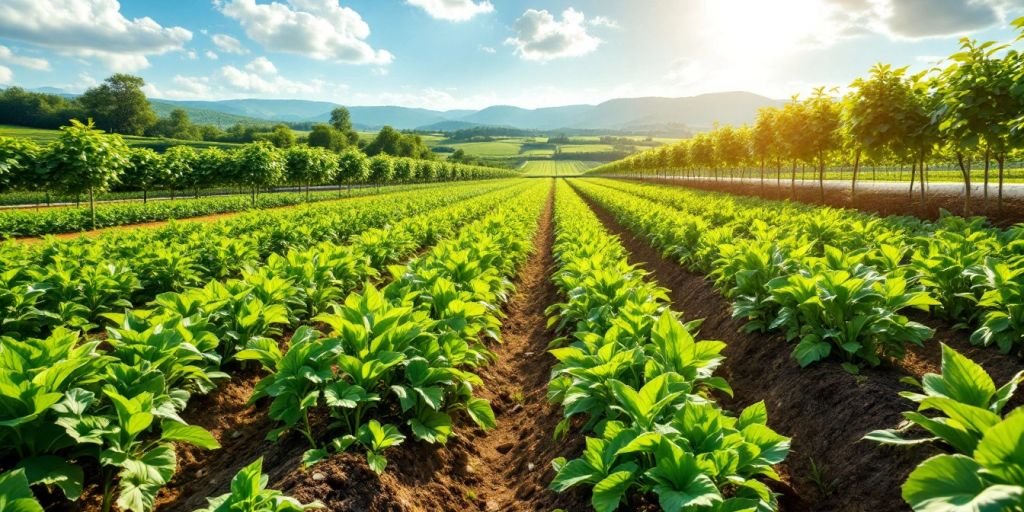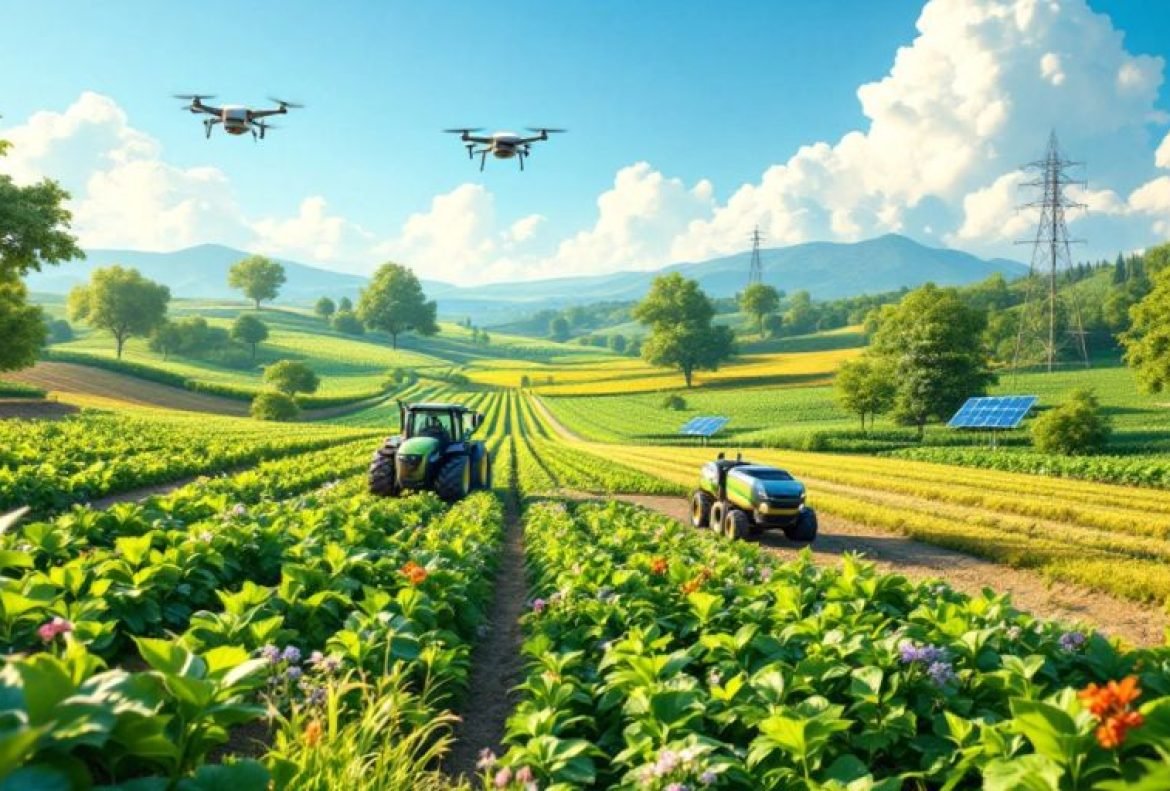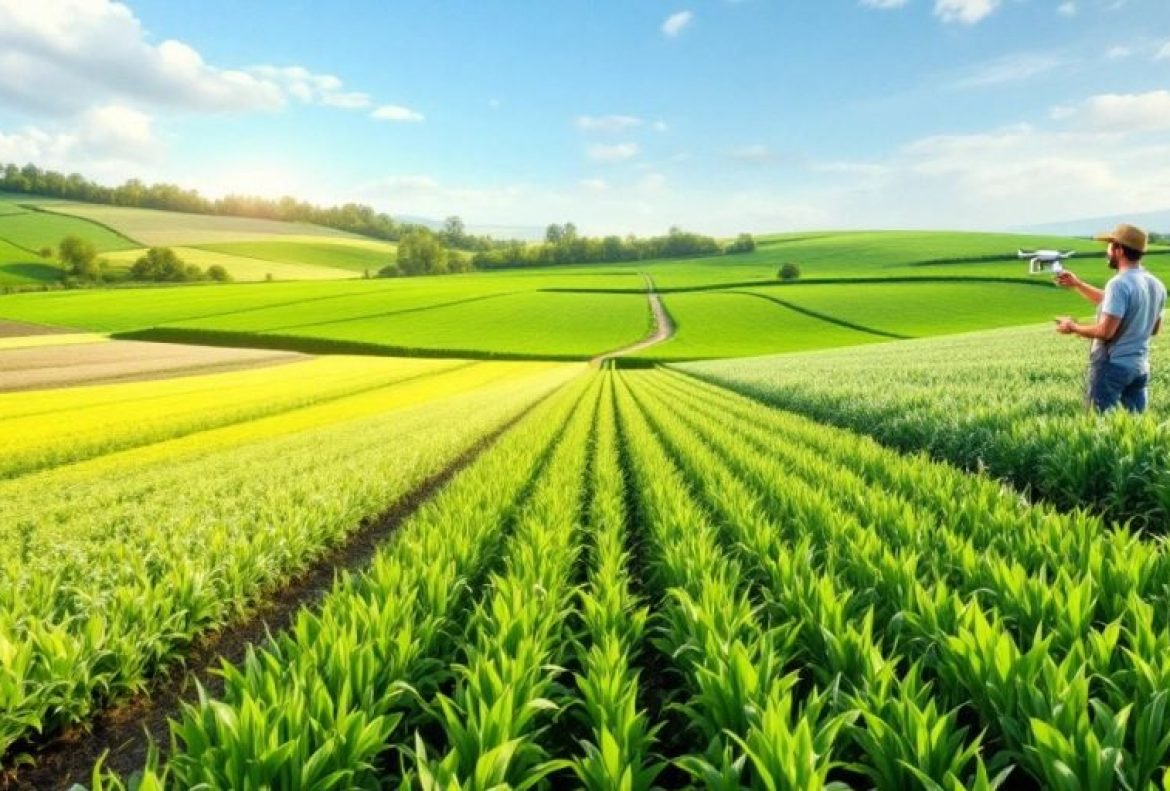Currently Empty: RM0.00

Agritech is changing the way we farm by using new technologies to make agriculture smarter and more efficient. As we face challenges like climate change and a growing population, these innovations are essential for a sustainable future in farming. This article explores various innovative solutions in agritech that are shaping the future of agriculture.
Key Takeaways
- Agritech uses technology like AI and drones to improve farming methods.
- Sustainable practices are vital for feeding a growing global population.
- Smart irrigation systems help save water and enhance crop quality.
- Companies like ICL Group and Idroplan are leading innovations in agritech.
- Digital tools are making farming more efficient and environmentally friendly.
Digital Synergy in Agriculture
The blend of digital technology and farming is creating a new era in agriculture. Digital tools are revolutionizing how we farm, making it more efficient and productive. Here are some key areas where this synergy is making a difference:
Precision Agriculture: Enhancing Efficiency
- Data-Driven Decisions: Farmers can use data to make better choices about planting and harvesting.
- Advanced Sensors: These tools help monitor soil health and crop conditions in real-time.
- Yield Mapping: Understanding which areas of a field produce the best crops helps in planning.
Smart Irrigation Systems: Optimizing Water Use
- Automated Watering: Systems that water crops only when needed save water and energy.
- Soil Moisture Sensors: These sensors ensure that crops get the right amount of water.
- Weather Forecast Integration: Smart systems adjust watering schedules based on weather predictions.
Drone Technology: Aerial Insights for Better Crop Management
- Crop Monitoring: Drones can quickly survey large fields, spotting issues like pests or diseases.
- Precision Spraying: Drones can apply fertilizers and pesticides more accurately, reducing waste.
- Data Collection: Drones gather valuable data that helps farmers make informed decisions.
The future of farming lies in the collaboration of technology and traditional practices. By embracing digital solutions, farmers can enhance productivity and sustainability.
In summary, the integration of digital tools in agriculture is not just a trend; it’s a necessary evolution. As we face challenges like climate change and food security, these innovations will play a crucial role in shaping the future of farming.
Highlight: iprima group fosters a collaborative ecosystem of niche businesses, leveraging shared resources to drive innovation and growth.
Sustainable Solutions for a Growing World
As the global population rises, the need for efficient food production becomes more critical. Agritech is not just a trend; it’s a necessity. Here are some innovative approaches that are making a difference:
Reducing Waste with Data-Driven Insights
- Smart analytics help farmers track crop health and reduce waste.
- Examples include using sensors to monitor soil conditions and adjust inputs accordingly.
- Companies like Borneo Fruits Farm are leading the way by utilizing advanced techniques to ensure high-quality, pesticide-free melons.
Optimizing Resource Use for Higher Yields
- Precision farming techniques allow for targeted application of water and fertilizers.
- This method not only boosts productivity but also conserves resources.
- Farmers can achieve up to 30% more yield with less input.
Promoting Environmental Stewardship in Farming
- Sustainable practices are essential for protecting our planet.
- Initiatives include:
- Crop rotation to maintain soil health.
- Organic farming to reduce chemical use.
- Community-supported agriculture (CSA) to connect local farms with consumers.
By embracing these sustainable solutions, we can ensure a healthier planet and a more secure food future.
Crafting a Smarter Agriculture Ecosystem
Integrating Advanced Sensors for Better Monitoring
In modern farming, advanced sensors play a crucial role. These devices help farmers monitor soil moisture, temperature, and nutrient levels in real-time. For example, using soil sensors can lead to a 20% increase in crop yields by ensuring plants receive the right amount of water and nutrients.
Utilizing Satellite Imagery for Precision Farming
Satellite imagery is revolutionizing how farmers view their fields. By analyzing images from space, farmers can identify areas needing attention, such as pest infestations or nutrient deficiencies. This technology allows for targeted interventions, reducing waste and improving overall crop health.
Leveraging Data Analytics for Informed Decision-Making
Data analytics is essential for making smart farming choices. By collecting and analyzing data, farmers can:
- Predict weather patterns and adjust planting schedules.
- Optimize fertilizer use to enhance growth while minimizing costs.
- Track crop performance over time to improve future yields.
The future of farming lies in using technology to create a more efficient and sustainable ecosystem.
In summary, crafting a smarter agriculture ecosystem involves integrating various technologies that work together to enhance productivity and sustainability. By embracing these innovations, farmers can ensure a more resilient future for agriculture.
Revolutionizing Farming with Digital Technology

Blending Traditional Practices with Modern Tech
The fusion of traditional farming methods with modern technology is reshaping agriculture. Farmers are now using tools like mobile apps and sensors to monitor crop health and soil conditions. For example, farmers can use apps to track weather patterns and adjust their planting schedules accordingly.
Customized Solutions for Enhanced Capability
Every farm is unique, and customized solutions are key to maximizing productivity. Technologies such as precision agriculture allow farmers to tailor their approaches based on specific field conditions. This means using the right amount of water, fertilizers, and pesticides only where needed, which can lead to better yields and reduced costs.
Improving Sustainability through Innovation
Innovation in farming technology is crucial for sustainability. Smart irrigation systems help conserve water by delivering it directly to plant roots, reducing waste. For instance, systems like N-Drip can cut water usage by up to 50%. This not only saves resources but also enhances crop quality.
The future of farming lies in the ability to adapt and innovate, ensuring that we can feed a growing population sustainably.
Summary of Key Innovations
| Technology | Benefit |
|---|---|
| Precision Agriculture | Increases efficiency and reduces waste |
| Smart Irrigation Systems | Optimizes water use |
| Farm Management Software | Streamlines operations |
Conclusion
Digital technology is revolutionizing farming, making it more efficient, sustainable, and capable of meeting the challenges of the future. As farmers embrace these innovations, they can ensure a more secure food supply for everyone.
For instance, Borneo Fruits Farm offers premium melons directly to consumers, showcasing how technology can enhance freshness and accessibility in agriculture.
By integrating these advancements, the agricultural sector can thrive in a rapidly changing world.
Companies Pioneering Agritech Innovations
ICL Group: Leading the Way in Digital Agriculture
ICL Group is a major player in the agritech field, focusing on sustainable practices. They are transforming agriculture with innovative solutions that benefit everyone from farmers to retailers. Their platforms, like GROWERS, provide data-driven insights that help farmers make better decisions.
Idroplan: Smart Irrigation Solutions
Idroplan is revolutionizing irrigation with its smart systems. They use sensors to monitor environmental conditions, ensuring crops get the right amount of water. This technology not only improves crop quality but also promotes sustainability.
Drone Photography Services: Enhancing Crop Management
Drone Photography Services utilizes drone technology to gather aerial data. This helps farmers identify plant stress and optimize irrigation. Their insights lead to better crop management and increased efficiency in farming practices.
The future of farming lies in the hands of innovative companies that are reshaping the agricultural landscape with technology.
| Company Name | Key Innovation | Focus Area |
|---|---|---|
| ICL Group | GROWERS platform | Digital Agriculture |
| Idroplan | Smart irrigation systems | Water Management |
| Drone Photography Services | Aerial imagery for crop management | Crop Monitoring |
These companies are setting the standard for agritech innovation, ensuring that farming becomes more efficient and sustainable for future generations.
Embracing Digital Innovations in Agriculture

The Role of AI in Modern Farming
Digital innovations are reshaping agriculture, making it smarter and more efficient. Artificial Intelligence (AI) is at the forefront, helping farmers analyze data and make better decisions. For example, AI can predict crop yields and optimize planting schedules, ensuring that farmers maximize their resources.
Building Data Banks for Farmers
Creating data banks is essential for modern farming. These databases store valuable information about soil health, weather patterns, and crop performance. By utilizing this data, farmers can:
- Make informed decisions about planting and harvesting.
- Reduce waste by applying the right amount of fertilizers and pesticides.
- Track market trends to sell their products at the best prices.
Creating AI-Inclusive Farms
The future of farming lies in AI-inclusive farms. These farms integrate technology to enhance productivity and sustainability. For instance, sensors can monitor soil moisture levels, allowing for precise irrigation. This not only conserves water but also improves crop quality.
Embracing digital innovations in agriculture is crucial for unlocking the potential of farming. Attend workshops to learn how to harness these technologies effectively.
In summary, the agricultural sector is rapidly adopting digital tools to improve efficiency and sustainability. By embracing these innovations, farmers can ensure a more productive future for agriculture.
Agritech: The Future of Farming
Agritech is reshaping how we think about farming. This digital transformation is crucial for meeting the needs of a growing population. With innovative technologies, farmers can produce more food while using fewer resources.
Transforming Farming Practices with Technology
- Precision Agriculture: Farmers use data and technology to monitor crops and soil health, leading to better yields.
- Smart Irrigation: Systems that adjust water usage based on weather and soil conditions help conserve water.
- Drones: These provide aerial views of fields, allowing farmers to spot issues early and manage crops effectively.
Ensuring Food Security through Innovation
- Vertical Farming: Growing crops in stacked layers maximizes space and reduces the need for pesticides.
- Genetic Engineering: Developing crops that can withstand harsh conditions ensures a stable food supply.
- Blockchain Technology: This enhances transparency in the food supply chain, helping to reduce waste and fraud.
Addressing Climate Challenges with Agritech
- Climate-Resilient Seeds: These are designed to thrive in changing weather patterns, ensuring consistent harvests.
- Renewable Energy: Solar and wind power are being integrated into farming operations to reduce carbon footprints.
- Data-Driven Insights: Farmers can make informed decisions based on real-time data, improving sustainability.
Agritech is not just about technology; it’s about creating a sustainable future for farming and the planet.
In conclusion, agritech is paving the way for a more efficient, sustainable, and secure agricultural future. As seen with Borneo Fruits Farm, which utilizes advanced techniques like greenhouse cultivation and fertigation, the focus on quality and sustainability is becoming a standard in the industry. This shift is essential for ensuring that we can feed the world while protecting our environment.
Innovative Technologies in Agritech
Bee Vectoring Technologies for Sustainable Farming
Bee Vectoring Technologies (BVT) is revolutionizing how we think about crop protection. By using honey bees to deliver targeted pest control, BVT replaces harmful chemicals with a natural solution. This method not only protects the bees but also enhances crop yield and soil health. For example, BVT is effective for crops like blueberries and tomatoes, making it suitable for farms of all sizes.
Farm Management Software: Streamlining Operations
Farm management software is essential for modern farming. It helps farmers manage everything from procurement to supply chain logistics. With tools like FarmERP, farmers can streamline their operations, leading to better efficiency and productivity. Here are some key benefits:
- Centralized management of resources
- Improved decision-making through data analysis
- Enhanced collaboration among stakeholders
Water Management Technology: Efficient Irrigation
Water management technology is crucial for sustainable farming. Traditional irrigation methods waste a lot of water, but innovations like N-Drip allow for precise water delivery directly to plant roots. This technology can reduce water usage by up to 50%, ensuring crops receive the right amount of moisture without waste.
| Technology | Water Savings | Crop Quality Improvement |
|---|---|---|
| N-Drip | Up to 50% | Yes |
| Traditional Flooding | 30% | No |
The future of farming lies in adopting these innovative technologies that not only enhance productivity but also promote sustainability.
In summary, the integration of these innovative technologies in agritech is paving the way for a more efficient and sustainable agricultural landscape. As we look towards 2025 and beyond, the role of agtech innovations will only grow, ensuring a brighter future for farming.
The Bigger Picture of Agritech
Agritech is reshaping the way we think about farming. This innovative sector is crucial for addressing global challenges. It focuses on four main areas that enhance agricultural practices:
Intelligent Crop Planning for Better Yields
- Data-Driven Decisions: Using technology to analyze weather patterns and soil conditions.
- Resource Management: Efficiently allocating seeds, water, and fertilizers.
- Forecasting Needs: Anticipating market demands to avoid overproduction.
Farmgate-to-Fork: Enhancing Supply Chain Transparency
- Traceability: Knowing where food comes from and how it’s produced.
- Reducing Waste: Minimizing losses from farm to table.
- Consumer Trust: Building confidence in food safety and quality.
Data as an Enabler in Agriculture
- Real-Time Monitoring: Using sensors to track crop health and soil moisture.
- Predictive Analytics: Anticipating issues before they become problems.
- Improved Communication: Connecting farmers with markets and consumers.
Agritech is not just about technology; it’s about creating a sustainable future for farming.
In summary, the rise of agritech is essential for modern agriculture, ensuring that we can meet the needs of a growing population while protecting our planet.
Smart Farming: The Next Frontier
Robotics in Agriculture: Automating Tasks
Robotics is revolutionizing farming! With the ability to program robots for tasks like sowing seeds and removing weeds, farmers can save time and reduce physical strain. For instance, some robots can eliminate up to 300,000 weeds per hour, making them invaluable on large farms.
IoT in Farming: Real-Time Monitoring
The Internet of Things (IoT) is enhancing farming by providing real-time data. Farmers can monitor soil moisture, crop health, and weather conditions instantly. This technology helps in making informed decisions, ensuring crops receive the right care at the right time.
Smart Packaging: Ensuring Food Quality
Smart packaging is a game changer in food safety. It uses sensors to track temperature and freshness, helping to prevent food-borne diseases. This technology ensures that consumers receive high-quality products while farmers can achieve better prices.
| Technology | Benefits | Example |
|---|---|---|
| Robotics | Automates tasks, saves time | Weeding robots |
| IoT | Real-time monitoring | Soil moisture sensors |
| Smart Packaging | Tracks quality, prevents waste | Temperature sensors |
In the future, smart farming will not only increase efficiency but also promote sustainability, ensuring a better world for generations to come.
Smart farming is changing the way we grow food. By using technology, farmers can make better choices and grow healthier crops. If you want to learn more about how smart farming can help you, visit our website for exciting updates and tips!
Conclusion
In conclusion, agritech is changing the way we farm and grow food. With new technologies, farmers can work smarter and produce more while using fewer resources. Companies like ICL Group, Idroplan, and Drone Photography Services are leading the way, showing how digital tools can help farmers make better decisions and improve their yields. As we face challenges like climate change and a growing population, these innovations are not just helpful; they are necessary for a sustainable future. By embracing these new methods, we can ensure that farming remains productive and efficient for generations to come.
Frequently Asked Questions
What is agritech and why is it important?
Agritech is the use of technology in farming. It’s important because it helps farmers grow more food efficiently and sustainably, which is crucial as the world’s population increases.
How does precision agriculture work?
Precision agriculture uses technology like sensors and data to help farmers know exactly what their crops need. This means they can use fewer resources and get better harvests.
What are smart irrigation systems?
Smart irrigation systems are advanced watering methods that use data to give plants the right amount of water. This helps save water and keeps crops healthy.
How can drones help in farming?
Drones can take pictures of fields from above, helping farmers see how their crops are doing. This information helps them manage their farms better.
What role does AI play in agriculture?
AI helps farmers make better decisions by analyzing data. It can predict weather patterns, suggest planting times, and even help with pest control.
What are the benefits of using farm management software?
Farm management software helps farmers organize their work, keep track of expenses, and manage their crops more efficiently, leading to better yields.
How does agritech promote sustainability?
Agritech promotes sustainability by using resources more efficiently, reducing waste, and helping farmers grow food in a way that protects the environment.
What is the future of farming with agritech?
The future of farming with agritech looks bright. With ongoing advancements, farming will become more efficient, sustainable, and capable of meeting the food needs of a growing population.


